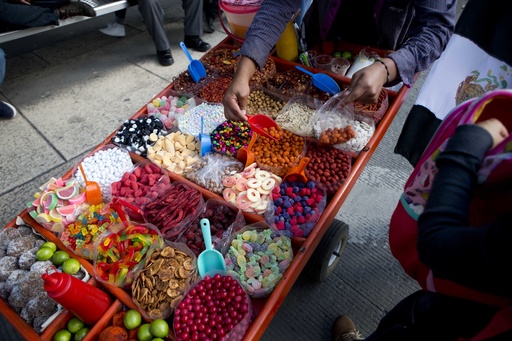
In Mexico, educational institutions will have a period of six months to enforce a government-mandated ban on junk food, according to officials who announced the decision on Monday.
This regulation, which came into effect following its publication on September 30, specifically targets popular items that have been consumed by generations of schoolchildren in the country.
Products under scrutiny include sugary beverages packaged in triangular cartons, potato chips, synthetic pork rinds, and peanuts encased in soy, often flavored with chili.
Schools that disregard this mandate could incur fines ranging from approximately $545 to $5,450, and these penalties could double if violations occur a second time, potentially equating to nearly a year’s worth of pay for some administrators.
According to the United Nations Children’s Fund, children in Mexico have the highest rate of junk food consumption in Latin America, obtaining around 40% of their dietary calories from such items, and the organization has classified child obesity in Mexico as an emergency.
The recently introduced ban reiterates a challenge initiated in previous years, as attempts to legislate against unhealthy food options have largely fallen flat.
President Claudia Sheinbaum emphasized the need for schools to provide water fountains and healthier snack alternatives, such as bean tacos.
She stated, “It is much better to eat a bean taco than a bag of potato chips,” and added, “It is much better to drink hibiscus flower water than soda.”
However, it is important to note that most of Mexico’s 255,000 schools lack access to free drinking water. A report from 2020 revealed that only about 10,900 schools, roughly 4% of the total, had successfully installed drinking fountains.
Many educational facilities are situated in impoverished or remote areas, making it difficult for them to maintain acceptable restrooms, provide internet access, or ensure reliable electricity.
Moreover, traditional recipes for beans, such as refried beans, often include substantial amounts of lard, which contradicts new regulations aimed at limiting saturated fat intake.
From 2010 to 2020, Mexico implemented front-of-package warning labels on food products to inform consumers about high levels of salt, added sugars, excessive calories, and saturated fats, with some snack items displaying all four of these cautionary labels.
Under the current rules, schools must eliminate any items containing even one warning label from their snack offerings.
However, it remains unclear how the government plans to regulate the sales of junk food by street vendors who typically operate near school grounds during recess.
Authorities in Mexico have declared that the nation faces the most severe childhood obesity crisis globally, with close to one-third of children categorized as overweight or obese.
